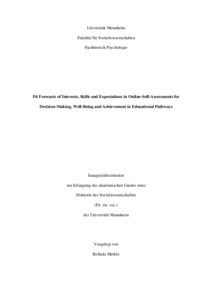|
Fit forecasts of interests, skills and expectations in online-self-assessments for decision-making, well-being and achievement in educational pathways
Merkle, Belinda
![[img]](https://madoc.bib.uni-mannheim.de/68329/1.hassmallThumbnailVersion/Merkle%20%282024%29_Dissertation.pdf)  Vorschau |
|
PDF
Merkle (2024)_Dissertation.pdf
- Veröffentlichte Version
Download (3MB)
|
|
URN:
|
urn:nbn:de:bsz:180-madoc-683296
|
|
Dokumenttyp:
|
Dissertation
|
|
Erscheinungsjahr:
|
2024
|
|
Ort der Veröffentlichung:
|
Mannheim
|
|
Hochschule:
|
Universität Mannheim
|
|
Gutachter:
|
Dickhäuser, Oliver
|
|
Sprache der Veröffentlichung:
|
Englisch
|
|
Einrichtung:
|
Fakultät für Sozialwissenschaften > Pädagogische Psychologie (Dickhäuser 2008-)
|
|
Fachgebiet:
|
150 Psychologie
|
|
Freie Schlagwörter (Englisch):
|
major-specific fit (interest, skills, expectations) , change in motivation , study major choice , study success (satisfaction, achievement) , online-self-assessment for study major choices
|
|
Abstract:
|
Choosing an educational path is a difficult life decision that can lead to unfavorable outcomes when it goes wrong. However, little research has examined how to support successful study major choice processes. Therefore, this dissertation investigates the role of subjective and objective major-specific fit forecasts for study major choice and success. Drawing on person-environment fit and (affective) forecasting bias theories, I argue that subjective forecasts—students' estimations of their fit and success within a specific future study major—can predict study success but can be assumed to be biased. Objective major- specific fit forecasts (in short also referred to as objective forecasts) are by definition based on empirically supported predictors for later success (e.g. interest-major fit, skill-major fit, expectation-major fit) and they assess these factors objectively based on a valid construal of the respective major (e.g., content and demands of the major based on expert estimates). Therefore, objective forecasts can be assumed to be less biased in predicting study success than subjective forecasts. Additionally relying on expectancy-value theory and cognitive dissonance theory, I argue that higher objective forecasts, when displayed in feedback, predict higher motivation to choose a major and higher likelihood of enrollment beyond subjective forecasts. Finally, I propose that prospective students receiving feedback on their objective forecasts before enrollment experience more success than those receiving no feedback. Hence, the goals of this dissertation program are (1) to develop an assessment for objective forecasts (2) to establish the predictive value of subjective forecasts for study success (3) to establish the predictive value of objective forecasts for study success beyond subjective forecasts (4) to establish the role of objective forecasts, when displayed in feedback to prospective students, for study major choice processes beyond subjective forecasts and the role of feedback on objective forecasts for study success. Concerning the first goal, my co-authors and I developed an online-self-assessment to assess and feedback objective forecast, using the example of the bachelor’s degree in psychology. Afterwards, we conducted an ecologically valid longitudinal field study, in which we observed over 4000 prospective students using the online-self-assessment in their study decision process. Of these prospective students, over 500 students subsequently entered the psychology major and took part in at least one of the three annual accompanying student survey waves we conducted including students from the first up to the fifth semester. Additionally, we surveyed over 200 students who did not receive feedback on their objective forecasts before enrollment. The dissertation findings showed that subjective forecasts predicted study success. Objective forecasts (interest-major fit, skill-major fit, valence of expectation-major fit) predicted study success beyond subjective forecasts. Higher objective forecasts related to higher motivation to choose the major and higher likelihood of enrollment beyond subjective forecasts. Finally, prospective students who received feedback on their objective forecasts before enrollment experienced more study success compared to students who received no feedback. In sum, this dissertation underlines the potential of objective forecasts in online-self-assessment beyond subjective forecasts for fostering successful study major choice processes.
|
 | Dieser Eintrag ist Teil der Universitätsbibliographie. |
 | Das Dokument wird vom Publikationsserver der Universitätsbibliothek Mannheim bereitgestellt. |
 Suche Autoren in Suche Autoren in
Sie haben einen Fehler gefunden? Teilen Sie uns Ihren Korrekturwunsch bitte hier mit: E-Mail
Actions (login required)
 |
Eintrag anzeigen |
|
 ORCID: 0000-0002-1916-0069
ORCID: 0000-0002-1916-0069



 Suche Autoren in
Suche Autoren in